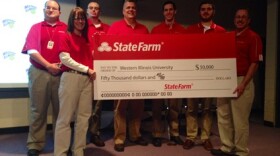Western Illinois University will begin offering a new Ph.D. program in environmental science this fall. The program focuses on large river ecosystems and will be housed at the Quad Cities campus.
Doctor Roger Viadero , the director of WIU’s Institute for Environmental Studies, will oversee the program. He says this is an area with tremendous opportunities for study.
"If you think about the Mississippi as one of the world’s largest rivers, we’ve got a river that’s important to people for recreation, cultural and historic reasons and also commerce. It’s not just the environment we are concerned with.”
This isn't just something that happens in the laboratory or in front of the computer. You truly, really and literally have to get your feet wet.
Viadero said the Quad Cities is a phenomenal location for the program.
“If you think about where we are physically there is just tremendous number of opportunities for students and faculty to do things right in our backyard," Viadero said. "So we’ve got location, location, location. Other folks have to drive four to five hours to get to their research station whereas we will be able to look out our lab windows and see the Mississippi river, which is cool.”
The facilities at the Quad Cities campus for your program will be ready in July. And you’re hoping the first class will start this fall?
“That’s the aim, yea. What we are looking at is 5-6 students to start. In a lot of cases, folks go bachelors, masters, ph.d. I’m guilty of that," Viadero said. "However, that’s not necessarily the case here. You have to have a master’s degree in physical or biological science. But again we are also looking at trying to have a broad enough appeal to engage folks that are also real-live practitioners. And that’s a little different then what you’ll find at a number of other Ph.D. programs.”
It sounds like this program is very unique especially when you factor in the location. Why is it that this hasn’t already been done before?
"The western region of Illinois doesn’t necessarily have a huge population," Viadero said. "Some of the other needs that a university might fulfill are covered by UI and there extension service and what have you. There’s definitely been a call, a historical call for more locally available higher education and again state funded education. And that’s what we are seeing now.”
In the works for quite a long time actually. You’ve been developing this programsince 2008. In that time you’ve reached out to a lot different groups for feedback from potential students and faculty to folks with local, state and federal government agencies. What was the overall consensus of those groups?
“It was pretty clear based on their feedback that yea [the Mississippi] it's important, it’s understudied and at this point you can’t really do enough to inform future decisions about the way we interact with the river," Viadero said. "This isn’t just something that happens in the laboratory or in front of the computer. You, truly, really and literally have to get your feet wet. You have to get out in the field and go places and see things and measure stuff and look for stuff where you think they should be and find things them where you wouldn’t think they’d be and explain why that happens.”
The environmental science program will be the only Ph.D. currently offered by Western. It joins more than 40 other undergraduate and graduate programs being offered at the Quad Cities campus.







